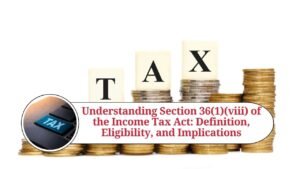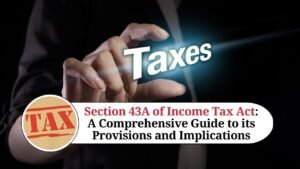The Income Tax Act provides a comprehensive framework for handling tax matters in India, including provisions for various business entities. For co-operative banks undergoing business reorganization, Section 72AB of the Income Tax Act is a crucial provision that governs the carry forward and set-off of accumulated losses and unabsorbed depreciation. In this blog, we will take an in-depth look at Section 72AB, its provisions, and how it impacts co-operative banks involved in amalgamation or demerger.
What is Section 72AB of the Income Tax Act?
Section 72AB was introduced by the Finance Act, 2007, effective from April 1, 2008. This section allows co-operative banks undergoing business reorganization (such as amalgamation or demerger) to carry forward and set off their accumulated losses and unabsorbed depreciation, ensuring that tax benefits continue for the successor bank. The primary aim of this provision is to facilitate the smooth continuation of banking operations post-reorganization without losing tax benefits accrued by the predecessor bank.

Key Provisions of Section 72AB
Section 72AB offers specific guidelines for both predecessor and successor co-operative banks when it comes to carrying forward and setting off accumulated losses and unabsorbed depreciation. Let’s break down the key provisions:
1. Carry Forward and Set-off of Accumulated Loss and Unabsorbed Depreciation
Under Section 72AB, a successor co-operative bank is allowed to set off the accumulated loss and unabsorbed depreciation of the predecessor co-operative bank as though the amalgamation or demerger had not occurred. This ensures continuity in tax benefits, with all the standard rules for carry forward and set-off of losses and depreciation under the Income Tax Act continuing to apply.
2. Conditions for Applicability
For a successor co-operative bank to avail the benefits under Section 72AB, both the predecessor and successor banks must fulfill certain conditions.
Predecessor Co-operative Bank:
- Must have been engaged in the banking business for at least three years.
- Must have held at least 75% of the book value of fixed assets for a continuous period of two years before the date of the business reorganization.
Successor Co-operative Bank:
- Must hold at least 75% of the book value of the predecessor co-operative bank’s fixed assets for a period of five years following the date of reorganization.
- Must continue the business operations of the predecessor co-operative bank for at least five years after the reorganization.
- Must comply with any other conditions prescribed by the Central Government to ensure that the business reorganization serves genuine business purposes.
3. Proportionate Set-off in the Case of Demerger
In the case of a demerger, the accumulated loss and unabsorbed depreciation will be set off in proportion to the assets transferred to the resulting co-operative bank. If the accumulated loss or depreciation is directly attributable to the undertaking transferred to the resulting bank, it will be fully set off. Otherwise, the amount set off will be proportionate to the assets transferred.
4. Non-Compliance and Penalties
If the successor co-operative bank fails to comply with any of the conditions laid out in Section 72AB or those notified by the Central Government, the accumulated loss or unabsorbed depreciation previously allowed will be deemed taxable income for the year in which the conditions are not met. This provision ensures that the benefits are only available to banks that genuinely aim to revive or continue the business operations of the predecessor bank.
5. Special Treatment of the Previous Year
The financial year in which the reorganization occurs is treated as two separate years for the purpose of setting off and carrying forward losses and depreciation. The period before the date of reorganization and the period after are considered two distinct years for tax purposes.
Definitions Under Section 72AB
To fully understand Section 72AB, it’s important to grasp the definitions of key terms such as accumulated loss and unabsorbed depreciation:
- Accumulated Loss: The loss under the head “Profits and Gains of Business or Profession” (excluding speculation business) of the predecessor co-operative bank. This is the amount the bank would have been able to carry forward and set off if the business reorganization had not occurred.
- Unabsorbed Depreciation: The depreciation allowance of the predecessor co-operative bank that remains unclaimed. This is the amount that would have been available to the predecessor bank had the reorganization not taken place.
Circular Clarification: Finance Act, 2007
The Finance Act, 2007, introduced Section 72AB, and the Income Tax Department further clarified its scope and effect in Circular No. 3/2008 dated March 12, 2008. The circular defines the terms related to business reorganization, such as amalgamation and demerger, specifically for co-operative banks. It also outlines the conditions that must be met for co-operative banks to benefit from the carry forward and set-off provisions.
Business Reorganization: Amalgamation vs. Demerger
Amalgamation of Co-operative Banks
In the context of co-operative banks, amalgamation refers to the merger of one or more co-operative banks into a single bank. Upon amalgamation:
- All the assets and liabilities of the amalgamating bank(s) become the assets and liabilities of the amalgamated bank.
- The members of the amalgamating bank(s) holding 75% or more of the voting rights become members of the amalgamated bank.
Demerger of Co-operative Banks
Demerger refers to the transfer of one or more undertakings of a demerged co-operative bank to a resulting co-operative bank. Upon demerger:
- All the assets and liabilities of the transferred undertaking(s) become the assets and liabilities of the resulting co-operative bank.
- The members and shareholders of the demerged bank receive proportional membership or shares in the resulting bank.
Applicability of Section 72AB
Section 72AB applies to business reorganizations occurring on or after April 1, 2008, and is relevant for assessment years 2008-09 onwards. It is an essential provision for co-operative banks undergoing amalgamation or demerger, ensuring that tax benefits such as accumulated loss and unabsorbed depreciation are not lost in the process of reorganization.
FAQs
Q1: What is the purpose of Section 72AB of the Income Tax Act?
Section 72AB allows co-operative banks undergoing business reorganization (such as amalgamation or demerger) to carry forward and set off accumulated losses and unabsorbed depreciation.
Q2: What are the conditions for the applicability of Section 72AB?
Both the predecessor and successor co-operative banks must meet certain conditions, such as holding a minimum percentage of assets and continuing business operations for a specified period.
Q3: How is accumulated loss defined under Section 72AB?
Accumulated loss refers to the loss under “Profits and Gains of Business or Profession” (excluding speculation losses) of the predecessor co-operative bank, which could be carried forward had the reorganization not taken place.
Q4: What happens if the conditions of Section 72AB are not met?
If the conditions are not met, the accumulated loss or unabsorbed depreciation previously allowed is considered taxable income for the successor co-operative bank in the year of non-compliance.
Q5: When did Section 72AB come into effect?
Section 72AB became effective on April 1, 2008, and applies to assessment years starting from 2008-09.
Conclusion
Section 72AB of the Income Tax Act plays a vital role in facilitating business reorganizations in the co-operative banking sector by preserving the tax benefits accrued by the predecessor bank. This provision ensures that co-operative banks undergoing amalgamation or demerger can continue to set off accumulated losses and unabsorbed depreciation, provided they meet the conditions specified in the section. By adhering to the guidelines set forth in Section 72AB, co-operative banks can successfully navigate the tax implications of business reorganization.
For more detailed insights on tax provisions for co-operative banks or for assistance with tax compliance, visit SmartTaxSaver.



